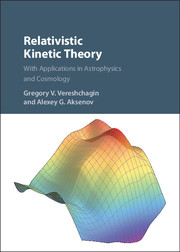Book contents
- Frontmatter
- Contents
- Preface
- Acknowledgments
- Acronyms and Definitions
- Introduction
- Part I Theoretical Foundations
- Part II Numerical Methods
- Part III Applications
- 10 Wave Dispersion in Relativistic Plasma
- 11 Thermalization in Relativistic Plasma
- 12 Kinetics of Particles in Strong Fields
- 13 Compton Scattering in Astrophysics and Cosmology
- 14 Self-Gravitating Systems
- 15 Neutrinos, Gravitational Collapse, and Supernovae
- Appendix A Hydrodynamic Equations in Orthogonal Curvilinear Coordinates
- Appendix B Collision Integrals in Electron-Positron Plasma
- Appendix C Collision Integrals for Weak Interactions
- Bibliography
- Index
14 - Self-Gravitating Systems
from Part III - Applications
Published online by Cambridge University Press: 09 March 2017
- Frontmatter
- Contents
- Preface
- Acknowledgments
- Acronyms and Definitions
- Introduction
- Part I Theoretical Foundations
- Part II Numerical Methods
- Part III Applications
- 10 Wave Dispersion in Relativistic Plasma
- 11 Thermalization in Relativistic Plasma
- 12 Kinetics of Particles in Strong Fields
- 13 Compton Scattering in Astrophysics and Cosmology
- 14 Self-Gravitating Systems
- 15 Neutrinos, Gravitational Collapse, and Supernovae
- Appendix A Hydrodynamic Equations in Orthogonal Curvilinear Coordinates
- Appendix B Collision Integrals in Electron-Positron Plasma
- Appendix C Collision Integrals for Weak Interactions
- Bibliography
- Index
Summary
Gravity is one of the four fundamental interactions, and it is the weakest one. Nevertheless, on largest scales, the structure of the universe is governed by gravity alone. This is essentially due to the long range and unscreened nature of gravitational interaction. These properties make self-gravitating systems with large numbers of particles very different from other systems with short-range interactions, such as gases, or systems with long-range screened interactions, such as neutral plasmas. In this chapter, kinetic properties of self-gravitating systems are discussed and contrasted with kinetic properties of gases and plasmas discussed in previous chapters. While before the focus has been always on relativistic aspects of KT, most essential properties of self-gravitating systems can be understood within a nonrelativistic context.
From the statistical physics point of view, there are fundamental differences between systems like gases and plasmas and systems with unscreened long-range interactions, in particular, self-gravitating systems.
First, extensivity of energy does not hold for self-gravitating systems. Extensivity is a property of thermodynamic variables such as energy entropy and free energy, that is, their proportionality to the size of the system. In contrast, intensive variables, such as entropy or temperature, do not depend on system size. Generally speaking, extensivity does not hold for any system with long-range interactions. In principle, the extensivity property can be restored if the interaction energy scales with the inverse of particle number [407]. However, systems with long-range interactions also lack additivity of energy, namely, such a property that the system can be divided into parts with total energy being the sum of energies of these parts, with the energy of interaction between parts vanishing in the thermodynamic limit. These unusual properties have a consequence, which is ensemble inequivalence [408], namely, that statistical descriptions based on canonical and microcanonical distributions give different results. Recall that a microcanonical ensemble is a statistical ensemble with specified and constant energy. In contrast, a canonical ensemble is a statistical ensemble of particles in thermal equilibrium with a heat bath at a given temperature.
- Type
- Chapter
- Information
- Relativistic Kinetic TheoryWith Applications in Astrophysics and Cosmology, pp. 226 - 261Publisher: Cambridge University PressPrint publication year: 2017



